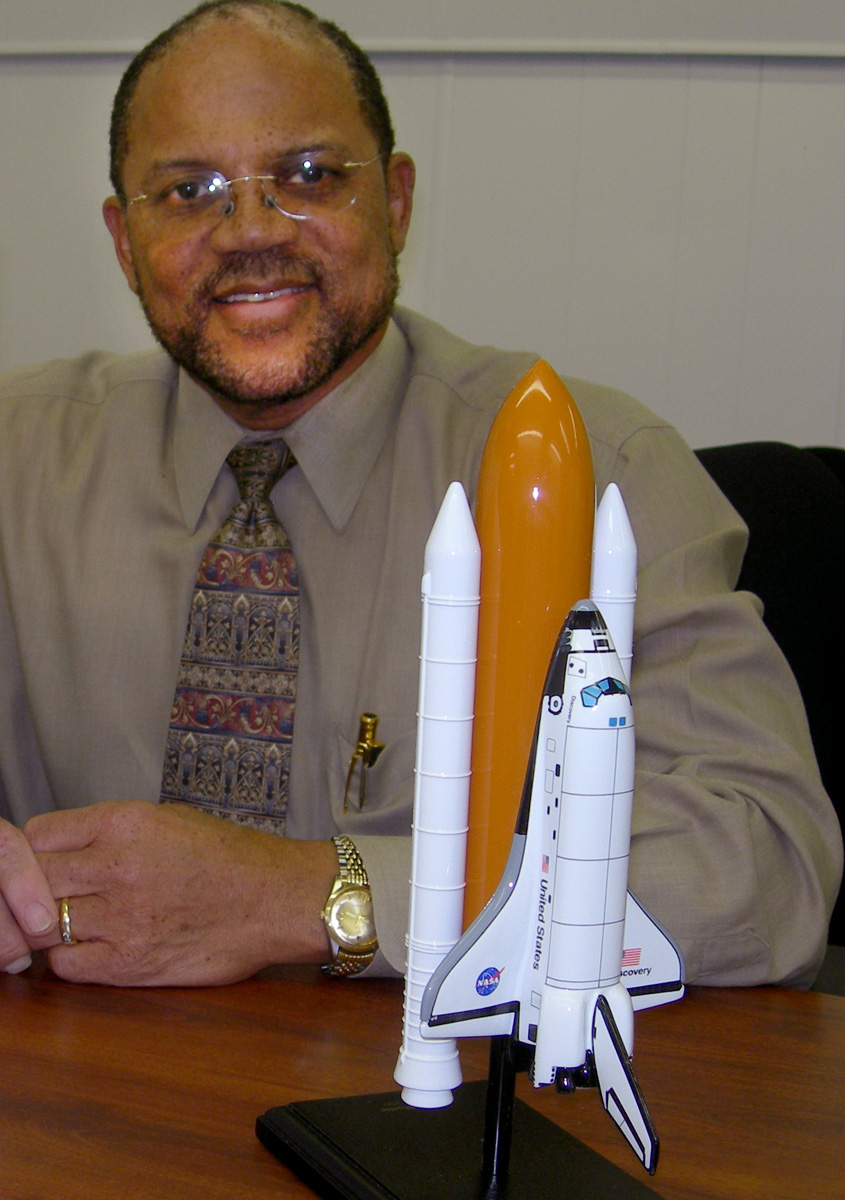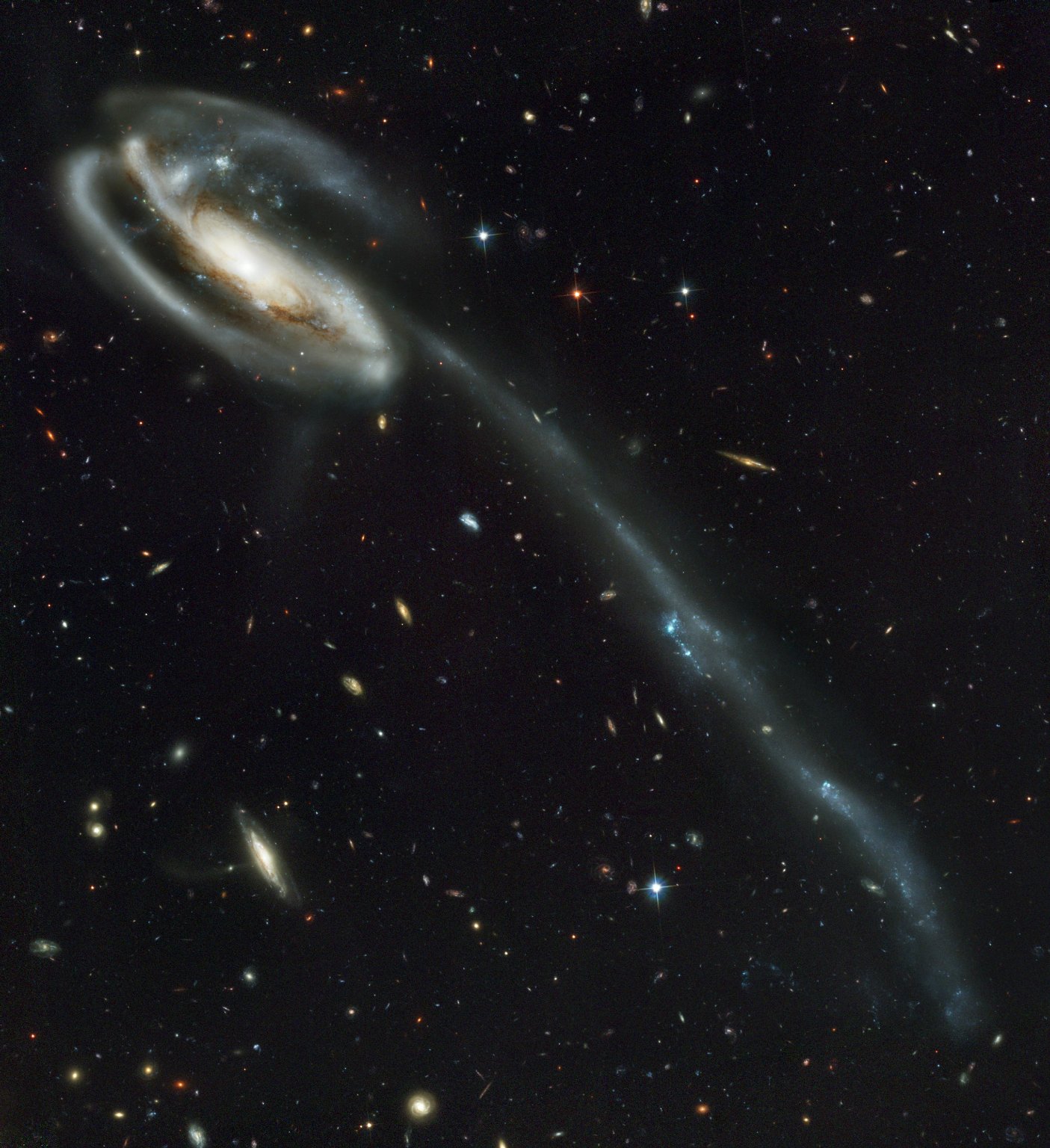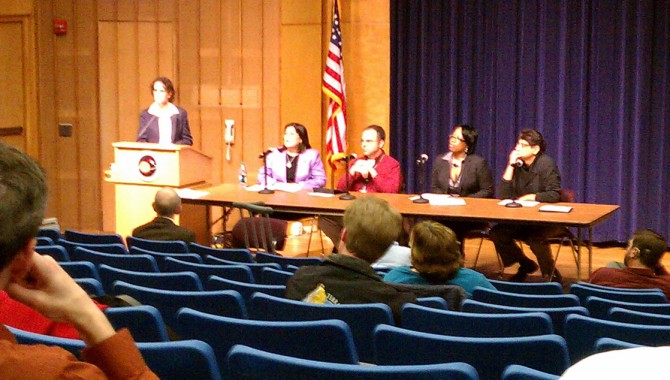
Panelists speak on the topic of line and project management at the 2012 Goddard Spring Masters Forum. (From right to left) Mansoor Ahmed, associate director for Astrophysics Projects Division, Donya Douglas-Bradshaw, head of the Systems Engineering Services and Advanced Concepts Branch, James O’Donnell, head of the Attitude Control Systems Engineering Branch, and Cathy Peddie, deputy project manager for the Wide-Field Infrared Survey Telescope (WFIRST). Photo Credit: NASA APPEL
April 30, 2012 Vol. 5, Issue 4
Goddard practitioners and leaders reflected on successes, failures, and the challenges of working on complex projects.
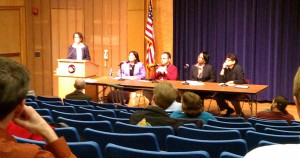
Panelists speak on the topic of line and project management at the 2012 Goddard Spring Masters Forum. (From right to left) Mansoor Ahmed, associate director for Astrophysics Projects Division, Donya Douglas-Bradshaw, head of the Systems Engineering Services and Advanced Concepts Branch, James O’Donnell, head of the Attitude Control Systems Engineering Branch, and Cathy Peddie, deputy project manager for the Wide-Field Infrared Survey Telescope (WFIRST).
Photo Credit: NASA APPEL
The full-day Masters Forum at Goddard Space Flight Center on April 24, 2012 addressed critical knowledge on topics ranging from projects to government audits. Highlights included a case study discussion with Glory Project Manager Bryan Fafaul (see “Balancing Risks for Glory”) and a discussion about learning from others with Center Director Chris Scolese and Goddard Chief Knowledge Officer Ed Rogers.
“We serve as a point of learning for others. What are the examples for NASA in terms of failure stories?” asked Rogers. He offered three examples:
- Flixborough Explosion (June 1, 1974) A vapor cloud explosion destroyed a chemical plant in Flixborough, U.K. The explosion killed 28 employees, injured 36 onsite and hundreds offsite, and damaged 1,800 homes and 170 businesses. The physical cause of the accident was that the bellows were not designed or tested properly for the thrust they would encounter. The proximate cause was that the bellows were not designed for the appropriate amount of thrust, which ultimately led to their failure.
- Tenerife Air Disaster (March 27, 1977) Two 747 jumbo jets collided on the runway, killing 583 people. A KLM jet attempted to take off while a Pan Am jet was taxiing off the runway. Due to foggy conditions, the decreased visibility prevented the control tower and the planes from adequately seeing what was happening on the runway. A number of factors including communication failures, increased traffic volume due to another airport closure, and schedule pressure contributed to the disaster.
- Gas Leak in Bhopal, India (December 2-3, 1984) 8,000 people died from methyl isocyanate gas inhalation from a gas leak at a Union Carbide chemical plant. At least four of the safety systems at the plant were turned off or nonfunctional, causing reactive pressure that overwhelmed the valves to go unnoticed.
The reasons for these failures are common to many other stories of disaster, explained Rogers, including complacency, ineffective risk assessments, organizational silence, and the failure to learn. “It’s easy to assume that we’re different from others,” Rogers said. “It’s easy to dwell on our successes and lose sight of the real risk involved in our work.” Questioning why something worked is just as important as wondering why something didn’t. “It’s very hard to change your behavior from a close-call because it did work—even if the lesson to be learned might be staring you in the face,” said Rogers. “We don’t do a MIB (Mishap Investigation Board) on a successful mission to see why it worked. If we are successful, do we really know why?”
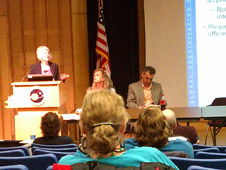
Candace Carlisle, deputy project manager, Art Azarbarzin, project manager, and Jackie Fiora, deputy project manager of resources, shared insights about in-house project management and earned value management on the Global Precipitation Measurement (GPM) mission at the 2012 Goddard Spring Masters Forum.
Photo Credit: NASA APPEL
“We all have a responsibility to keep on learning,” said Scolese. “You’re all doing that by being here today.” He engaged the audience in a discussion about learning from failure. When asked how one can fully appreciate and learn from what happened on another project or team by simply reading about the incident without fully experiencing it, he responded, “I wouldn’t just ask you to read something. You read it and you apply it to what it is you’re doing today. It’s never as good as experience, but it certainly helps.”
Scolese shared his early experience working in the nuclear navy and the weekly activity summaries he reads to stay current and aware. Today, he takes the time to read books about projects like the Brooklyn Bridge and the transcontinental railroad. “This should be a priority,” he said. “You get a lot of knowledge from that.”
The morning panelists featured Candace Carlisle, deputy project manager, Art Azarbarzin, project manager, and Jackie Fiora, deputy project manager of resources, who shared insights about in-house project management and earned value management on the Global Precipitation Measurement (GPM) mission, an international collaboration with the Japan Aerospace Exploration Agency; Sally Godfrey, software benchmarking co-lead for the Office of the Chief Engineer, who discussed NASA’s software engineering benchmarking effort; Rebecca Derro, training lead for the Product Development Lead (PDL) Engineering Training Program at Goddard, who provided an overview of the PDL program; and Bill Paradis, schedule manager for GPM, who provided insight into using practical techniques for leveraging scheduling productivity on projects.
The afternoon panels addressed the topics of effective line management and the Government Accountability Office (GAO) project audit process. Mansoor Ahmed, associate director for Astrophysics Projects Division, Donya Douglas-Bradshaw, head of the Systems Engineering Services and Advanced Concepts Branch, James O’Donnell, head of the Attitude Control Systems Engineering Branch, and Cathy Peddie, deputy project manager for the Wide-Field Infrared Survey Telescope, discussed the components of successful line and project management.
John Decker, associate director for the Flight Projects Directorate, Bryan Fafaul, project manager for Joint Polar Satellite System (JPSS), and Theresa Ballinger, chief of the Office of Quality Assurance and Policy Standards at Goddard, chaired a panel on the GAO audit process.
Upcoming events from the Goddard Office of the Chief Knowledge Officer will include a workshop on organizational silence in July.Read about a previous workshop on the topic.
Access the forum presentations and materials.(NASA Internal Only, NDC Login Required)






